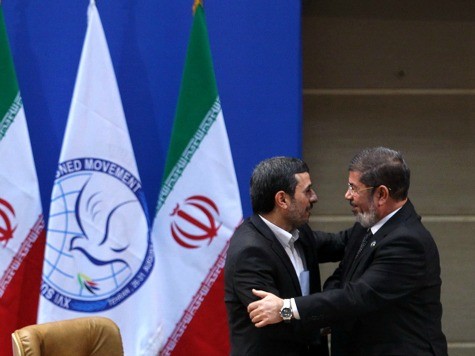The fusillade of rockets launched into Southern Israel over the past week is a clear indication that the terrorist organization, Hamas, has grown increasingly bolder and more capable. But how did this progression occur? Both Iran and the Obama Administration’s failure to ensure the emergence of responsible actors in the wake of Muammar Gaddafi’s fall from power are to blame.
The main influx of weapons and military capabilities presently in Gaza originates from Iran. Iran frequently transports illicit cargo and weaponry across land, or via cargo ships along the Mediterranean Sea, into Sudan. This is precisely how Hamas obtained the Fajr-5 rockets that were launched at Tel-Aviv. The existence of this supply chain was apparently confirmed last month when Israeli warplanes allegedly bombed an Iranian weapons storage facility in Khartoum. In addition, the Qod’s Force, Iran’s elite Revolutionary Guard Corps, regularly sends representatives to Gaza to train Hamas operatives.
America’s recent foreign policy failure in Libya added fuel to the fire. Concomitantly with the fall of the house of Gaddafi, Islamic extremists in Libya hurried to fill the power vacuum created by Gaddafi’s demise. American efforts to stem the flow of weapons exiting Libya have largely failed, and Islamic extremists, with weapons in tow, have made a mass exodus across the Middle East, flooding the region with huge caches of stolen weapons seized during the Libyan revolution. Currently, Libyan weapons are being used to arm conflicts across the entire Middle East, from Northern Africa and the Sahel region, all the way to the Sinai Peninsula.
Once the weapons reach Egypt, it becomes relatively easy to smuggle them into Gaza. Hamas does so ubiquitously (and often with tacit approval from Egypt) via Rafah, Egypt’s porous southern border crossing with Israel. According to media reports, thousands of weapons have entered Gaza, including Soviet-supplied SA-24 surface-to-air missiles and rocket-propelled-grenades that are designed to penetrate armor. During Operation Pillar of Defense, Iranian missiles and technology helped Hamas kill one Israeli soldier and four civilians, and injure 240. The weapons smuggled into Gaza from Libya will likely be used by Hamas against Israeli soldiers in the event of a future Israeli ground invasion.
Two months ago America witnessed the tragic murder of Ambassador Stevens and three other brave Americans. This was the immediate result of America’s failure to enforce order, or to at least protect its own interests, in Libya. Hamas’ growing capability and brazenness in Gaza are the latest, most recent, manifestations of this failure. Now was the time for action — decisive action that should have been taken before more surprises could occur.
The cease-fire currently being implemented by Secretary of State Hilary Clinton and Egyptian President Mohammed Morsi, however, is not the answer.
Mr. Morsi (his political career is outlined in this document) is the former leader of the Muslim Brotherhood, the forbearer of Hamas, and has himself repeatedly referred to the Jews as “the sons of pigs and apes.” In the current escalation of violence, Mr. Morsi vehemently backed Hamas’ right to use terrorism against the “occupation,” and even sent the Egyptian Prime Minister to Gaza in a show of solidarity toward Hamas. A peace deal brokered by Mr. Morsi makes Israel seem weak and the threat of a future ground invasion into Gaza to appear like a mere bluff. By forcing Israel to negotiate with Mr. Morsi, Secretary Clinton has emasculated Israel’s deterrent capabilities, effectively emboldening Hamas and its proxy, Iran.
From Secretary Clinton’s perspective, the current crisis may have represented a quintessential opportunity, but for slightly different reasons. The United States delivers $1.3 billion dollars of aid annually to Egypt. Thus, Secretary Clinton undoubtedly saw the negotiations as a chance not only to prop up Mr. Morsi as a credible world leader and Middle East arbiter, but to prove himself worthy of American aid as well.
Yet if Mr. Morsi “delivered,” it was likely not out of any particular allegiance to America or Israel, but because he has become a very savvy politician, one who knows better than to bite the hand that feeds him. Indeed, as French epigramist François de la Rochefoucauld once wrote: “Hypocrisy is the tribute that vice pays to virtue.”
The current bout of violence could have been used as an opportunity by both Israel and the United States to eradicate Hamas and deal a major blow to its proxy, Iran. Secretary Clinton could have rightfully affirmed Israel’s moral obligation to root out terror from its midst. She could have also pledged unwavering American support for an all-out Israeli operation, as Mr. Morsi has done for Hamas. Instead, by forcing Israel to negotiate with Hamas and Mr. Morsi, Secretary Clinton has undermined America’s one true ally in the Middle East.
This is indeed sad. For as long as Hamas remains emboldened by Iran, there will never be a framework for peace in the Middle East.
Mr. Raskas served in the Israel Defense Forces and is currently a research analyst for SecureAmericaNow.org.

COMMENTS
Please let us know if you're having issues with commenting.